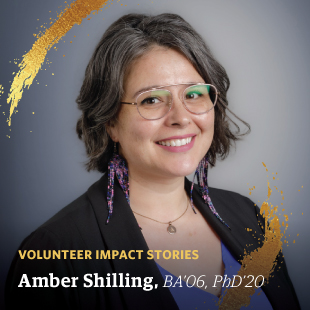Amber Shilling: Connecting with community through Indigenous networks

One day when the skies unleashed a downpour, a UBC Bachelor of Arts student sought refuge in a building. Serendipitously, she found herself in the UBC First Nations Longhouse. Perhaps it was because her Anishinaabe namesake Giijigaanikwadok happens to mean “out of the clouds.”
As an Anishinaabekwe from Mnjikaning First Nation (located in what is now known as Ontario), Giijigaanikwadok, also known as Amber Shilling (BA’06, PhD’20), had been nervous about visiting this building. Born and raised in Moh-kíns-tsis (Calgary), she was uncertain if other Indigenous people at UBC would accept her as an uninvited guest in the traditional, ancestral, and unceded territory of the hən̓q̓əmin̓əm̓ speaking xʷməθkʷəy̓əm (Musqueam) people.
Yet once inside, she met many people, including another Anishinaabekwe who remains her mentor to this day. All of them welcomed her. And so began Shilling’s volunteer work for Indigenous organizations at UBC, which she continued on with even after graduation to maintain connections with Indigenous communities.
“I felt that I was contributing to my community and becoming a part of the community in a way that I hadn’t really experienced before,” she says.
Overall, her experience at UBC, which she regards as her “home away from home,” was encouraging and nurturing.
“I learned that positive education experiences are so critical in improving outcomes and supporting community members to have fulfilling experiences in life,” she says.
That realization underscores the deeper significance of her own educational journey.
She is the first person in her family to attend university. In addition, she is the first person on her father’s side of her family who didn’t attend residential school. Yet messages like “education is important” and “education is the way forward,” she points out, can conflict with the experiences of Indigenous families and communities for whom education was traumatic. That’s why connecting with other students, staff, and faculty dealing with similar issues was “unique and priceless” to Shilling.
Going beyond her own expectations, she pursued a PhD in Educational Studies. But when it came time for her dissertation defense, the COVID-19 pandemic hit.
“I think it was the combination of the pandemic experience and the finishing of such a rich, supportive environment for learning that I really longed for something to support our graduates after we complete,” she explains.
Consequently, she and Education Dean pro tem Dr. Jan Hare (PhD’01), an Anishinaabe scholar and educator from the M’Chigeeng First Nation, began discussing how to sustain community connections after graduation.
Ultimately, the UBC Faculty of Education Indigenous Alumni Network (IAN) was created. Fittingly, the launch on March 14, 2024, featured a panel discussion about balancing professional pressures with the need to prioritize personal well-being.
While the IAN will help alumni connect with their peers and their educational past, undergrad and graduate student representatives will provide perspectives from upcoming generations.
As an educator devoted to furthering Indigenous education, Marny Point (BEd’02, MET’04) regards student involvement as integral for building the network. Point, from the Musqueam band of the Coast Salish people, is a Program Coordinator with NITEP, the Indigenous Teacher Education Program, and is volunteering as an IAN Member at Large.
“It offers the benefits of affiliation, a weaving together the wisdom and knowledge of those who have been on this career path before the ‘new or novice’ ones,” she says of student representation in the IAN.
Point, who was also the first member of her family to attend and graduate from university, feels that her early alumni connections and networking were invaluable to her, especially when she applied to the PhD program.
In addition, Point, who has been a First Nations and Endangered Languages Program instructor, thinks the network can allow students to “bloom” as they interact with alumni, which can help them transition from student into colleagues.
“Hopefully students may connect with an alum that would be able to guide and encourage them to continue to strive and meet their personal career goals,” she says.
Shilling, now the executive director of Indigenous Education at the Government of British Columbia, adds that leaving the nurturing and community-building world of academia can be jarring for Indigenous grads. She has observed how many Indigenous professionals can find themselves as the sole Indigenous person at work, which can be isolating and even potentially dangerous for Indigenous women.
“We often end up in spaces that aren’t necessarily as warm and welcoming or not as culturally aware or safe for us to be,” she says. “Some of those harder experiences that I’ve had, outside of UBC, have helped me think about what it was about the community at UBC that really helped me stand strong in who I am and understand my role in a good way.”
She says she reflects upon how she can imbue other spaces with that sense of support. Accordingly, the IAN can potentially help fulfill some of those aspirations.
“The vision of this network is to provide that safe space, again, to have that regular connection with people who understand what you’re going through and can support that through peer mentoring, through even just listening hearing and saying, ‘I hear you. I see you…’,” she says. “And so that’s really why I felt it’s super important for us as Indigenous alum to have a space where we can kind of share some of those experiences that are truly unique to us.”

